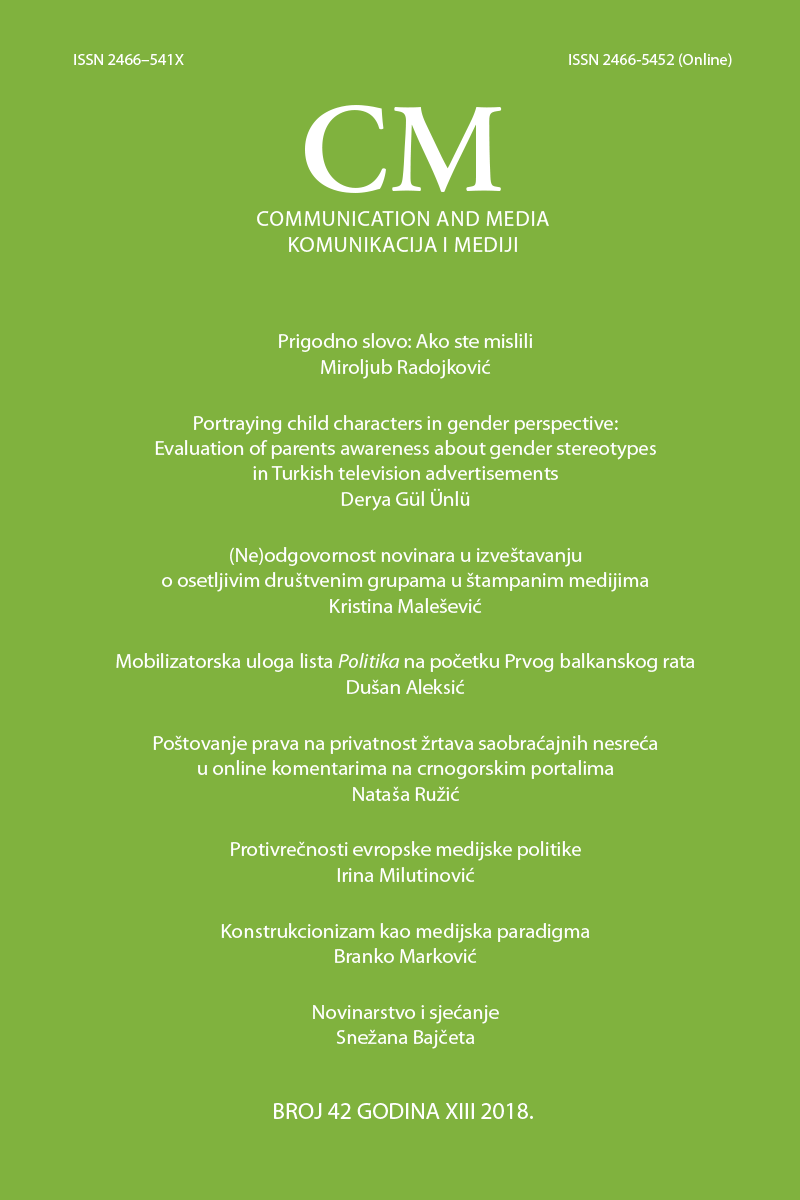RESPECTING THE RIGHT TO PRIVACY OF TRAFFIC ACCIDENT VICTIMS IN ONLINE COMMENTS ON MONTENEGRIN PORTALS
Abstract
The emergence of digital media on the market is accompanied by new ethical problems and dilemmas, which urges the necessity of a constant revision of codes of ethics. Technological development has led to the participatory journalism, which was supposed to result in the transformation of the media into a public forum. However, there is a clear tendency of citizens not only to exchange opinions in relation to topics of public interest, but also to comment on crime column articles, without paying attention to the victims’ right to privacy and mocking those affected. If journalists violated the citizens’ right to privacy with sensationalist reporting about crime and interviews with controversial figures in the 1830s, then today citizens are the ones violating the right to privacy of crime and accident victims by disclosing details about those involved in the events, while the media do not try to tackle this problem through internal codes of ethics. On the basis of content analysis of the comments posted on the two most visited online portals in Montenegro (Vijesti and Analitika), in this paper we aim to determine to what degree the media, but also the citizens, respect the right to privacy of the victims of traffic accidents. The results show that both portals take care of the ethical dimensions of the content of online comments: they are dominated by ethical comments in which the citizens express their views. With much higher number of comments than Analitika, portal Vijesti has a harder task and it allowed for publication the comments which contain sarcastic remarks about the texts.
References
Alexa (n.d.). Posjećeno 10.07.2017. URL: www.alexa.com.
Bertrand J. (2007). Deontologija medija. Zagreb: ICEJ.
Bok, S. (1989). Lying: Moral choice in Public and Private Life. New York: Vintage.
Council of Europe (1950). Convention for the Protection of Human Rights and Fundamental Freedoms,. Posjećeno 01.07.2017. URL: https://www.echr.coe.int/Documents/Convention_BOS.pdf.
Dej, L. (2004). Etika u medijima- primeri i kontraverze. Beograd: Medija centar.
Garfinkel, S.(2000). Database Nation: The Death of Privacy in the 21st Century. California: O'Reilly.
Gocini, Đ. (2001). Istorija novinarstva. Beograd: Clio.
Kodeks novinara Crne Gore (2002). Posjećeno 10.07.2017. URL: https://www.mminstitute.org/kodeks.html.
Kodeks novinara Crne Gore (2016). Posjećeno 10.07.2017. URL: http://www.osce.org/fom/255576?download=true.
Krippendorf, K. (1980). Content Analysis. An Introduction to Its Methodology. Berverly Hills: Sage.
Media centar (2013). NYT: Komentari čitalaca postaju dio priče. Media centar online. Posjećeno 01.07.2017. URL: http://media.ba/bs/vijesti-i-dogadaji-vijesti/nyt-komentari-citalaca-postaju-dio-price.
Pravilnik o elektronskim publikacijama (2016). Službeni list Crne Gore, br. 07/2016 od 29.01.2016. Posjećeno 10.07.2017. URL: http://www.sluzbenilist.me/PravniAktDetalji.aspx?tag=%7B09B3A7CC-79DF-4CC8-8458-7A561E62838D%7D.
Preporuka CM/REC(2014)6 Komiteta ministara državama članicama o Vodiču o ljudskim pravima za korisnike interneta (2015). In Zbornik odabranih pravnih instrumenata Savjeta Evrope u vezi sa medijima 2007-2014. (pp. 138–176). Beograd: Kancelarija Savjeta Evrope
Shackelford, S. (2012). Fragile Merchandise: A Comparative Analysis of the Privacy Rights for Public Figures, American Business Law Journal, 49(1): 125–20.
UN (1948). Univerzalna deklaracija o ljudskim pravima. Posjećeno 01.07.2017. URL: http://www.ombudsman.co.me/docs/deklaracija_o_ljudskim_pravima.pdf.
Ustav Crne Gore (2007). Službeni list Crne Gore, br. 1/2007.
Vijesti (n.d.). Pravila komentarisanja. Posjećeno 01.07.2017. URL: http://www.vijesti.me/pravila-komentarisanja/.
Vilović, G. (2007). Povijest vijesti. Zagreb: ICEJ
Warren, S. & Brandeis, L. (1890). The Right to Privacy. Harvard Law Review, 4(5): 193–220.
Whitehouse, G. (2010). Newsgathering and Privacy: Expanding Ethics Codes to Reflect Charge in the Digital Media Age. Journal of Mass Media Ethics: Exploring Questions of Media Morality, 25(4): 310–327
Zakon o elektronskim medijima (2010). Službeni list Crne Gore, br. 046/10, 040/11, 053/11, 006/13,055/16.
Zakon o medijima (2002). Službeni list Crne Gore, br. 51/02, 062/02, br. 046/10, 073/10 040/11.
Zakon o nacionalnom javnom emiteru Radio i Televizija Crne Gore (2008). Službeni list Crne Gore, br. 79/08, 45/12, 43/16, 54/16
Zbornik odabranih pravnih instrumenata Savjeta Evrope u vezi sa medijima 2007-2014. (2015). Beograd: Kancelarija Savjeta Evrope.
Žaket, D. (2007). Novinarska etika – moralna odgovornost u medijima. Beograd: Službeni glasnik.
Copyright
Authors retain copyright of the published papers and grant to the publisher the non-exclusive right to publish the article, to be cited as its original publisher in case of reuse, and to distribute it in all forms and media.
Licensing
The published articles will be distributed under the Creative Commons Attribution ShareAlike 4.0 International license (CC BY-SA). It is allowed to copy and redistribute the material in any medium or format, and remix, transform, and build upon it for any purpose, even commercially, as long as appropriate credit is given to the original author(s), a link to the license is provided, it is indicated if changes were made and the new work is distributed under the same license as the original.
Users are required to provide full bibliographic description of the original publication (authors, article title, journal title, volume, issue, pages), as well as its DOI code. In electronic publishing, users are also required to link the content with both the original article published in CM: Communication and Media and the licence used.
Authors are able to enter into separate, additional contractual arrangements for the non-exclusive distribution of the journal's published version of the work (e.g., post it to an institutional repository or publish it in a book), with an acknowledgement of its initial publication in this journal.
Self-archiving policy
Authors are permitted to deposit author’s publisher's version (PDF) of their work in an institutional repository, subject-based repository, author's personal website (including social networking sites, such as ResearchGate, Academia.edu, etc.), at any time after publication.
Full bibliographic information (authors, article title, journal title, volume, issue, pages) about the original publication must be provided and links must be made to the article's DOI and the license.
Disclaimer
The views expressed in the published works do not express the views of the Editors and the Editorial Staff. The authors take legal and moral responsibility for the ideas expressed in the articles. Publisher shall have no liability in the event of issuance of any claims for damages. The Publisher will not be held legally responsible should there be any claims for compensation.

